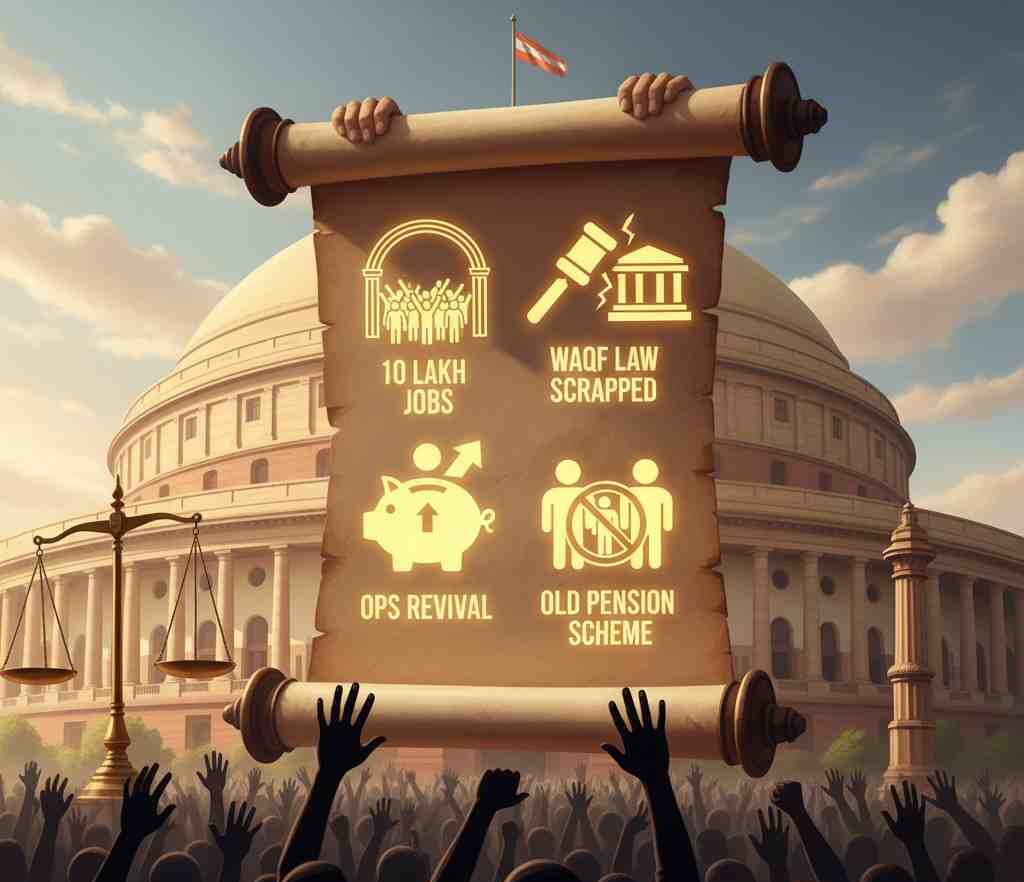The Mahagathbandhan’s Bihar manifesto, led by Tejashwi Yadav, promises one government job per family, revival of the Old Pension Scheme, financial aid for women, and rejection of the Waqf (Amendment) Act. Here’s a detailed look at the key highlights ahead of the Bihar Assembly Elections 2025.
Mahagathbandhan Bihar Manifesto 2025: A Comprehensive Overview
With Bihar gearing up for the assembly elections on November 6 and 11, 2025, the Mahagathbandhan (Grand Alliance) — comprising the RJD, Congress, and Left parties — has become the first political coalition to release its manifesto. The document, unveiled by Tejashwi Yadav, outlines an ambitious vision centered around job creation, women’s empowerment, welfare schemes, and policy reversals.
Tejashwi Yadav, the alliance’s chief ministerial candidate, has made employment generation and social justice the central pillars of his campaign. Let’s dive into the major takeaways from the manifesto.
Promise to Scrap the Waqf (Amendment) Act
One of the most striking points in the manifesto is the rejection of the Waqf (Amendment) Act, passed by Parliament in April. The Mahagathbandhan has vowed not to implement this law in Bihar, arguing it infringes on property rights and personal freedoms. Tejashwi Yadav reaffirmed his earlier stance, stating that the law would be “discarded completely” if the alliance forms the government.
This move appears aimed at addressing public concerns about property disputes under the Act and appealing to communities that see the law as intrusive.
Employment for Every Family
The flagship promise of the manifesto is one government job per family. Within 20 days of forming the government, the alliance pledges to pass legislation guaranteeing employment to at least one member in each household.
In addition, skill-based job creation will be prioritized through IT parks, SEZs, agro-industries, healthcare, renewable energy, manufacturing, logistics, and tourism sectors. The manifesto also proposes an Educational City and five new expressways spread over 2,000 acres to boost infrastructure and industry.
Regularization of Contract Workers
All contractual and outsourced employees in the state will be made permanent government workers. The manifesto also promises that Jeevika CM (Community Mobiliser) sisters will be granted government employee status with a fixed monthly salary of ₹30,000. This measure is designed to stabilize the livelihoods of thousands of women and informal workers in Bihar.
Revival of the Old Pension Scheme (OPS)
The Mahagathbandhan has pledged to restore the Old Pension Scheme (OPS) for state government employees, a demand long voiced by workers’ unions across India. The OPS provides guaranteed pensions after retirement, unlike the contributory National Pension System (NPS), making it a politically sensitive and popular move.
Women-Centric Schemes
Under the proposed “Mai-Behin Maan Yojana,” women will receive ₹2,500 per month in financial assistance starting from December. Additionally, the manifesto emphasizes social security pensions for widows and the elderly — ₹15,002 per month with a yearly increase of ₹2,200. Persons with disabilities will receive ₹3,000 monthly, while 200 units of free electricity will be given to every family.
Regulation of Microfinance Institutions
To protect women borrowers, the Mahagathbandhan proposes legislation to regulate microfinance companies, particularly to curb harassment during loan recoveries and control arbitrary interest rates. This aims to safeguard rural women involved in self-help groups and small-scale enterprises.
Conclusion
The Mahagathbandhan manifesto sets an ambitious tone ahead of the Bihar Assembly Elections 2025, focusing on jobs, social justice, welfare, and women’s empowerment. While critics may question the financial feasibility of some promises, Tejashwi Yadav’s proposals — from scrapping the Waqf Law to ensuring jobs for every family — are crafted to resonate with Bihar’s youth and working-class voters.
As the ruling BJP-JDU alliance is yet to unveil its own manifesto, the Mahagathbandhan has taken the early lead in shaping the election narrative around employment and equality.

























